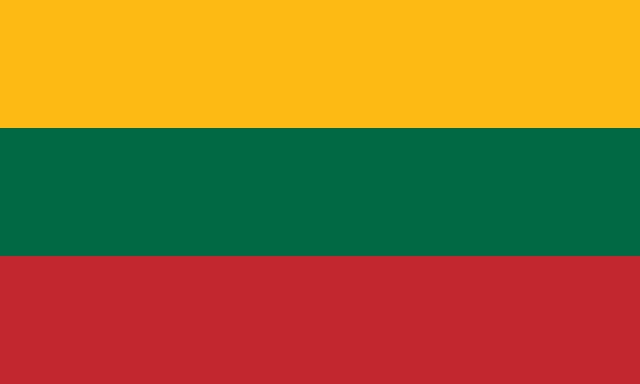1. 2021-2027 Partnership Agreement between the European Commission and Lithuania
According to partnership agreement 6.4 billion has been allocated to Lithuania. EUR cohesion policy funds in 2021-2027. during the investment period. Additionally, Lithuania plans to contribute 1.7 billion. euros with national funds – therefore, the total value of EU investments amounts to 8 billion. euros. The partnership agreement includes cohesion policy funds: European Regional Development Fund (ERDF), European Social Fund + (ESF+), Cohesion Fund (SF), Just Transition Fund (TF), European Maritime, Fisheries and Aquaculture Fund (EMFF). The main 2021-2027 The objectives of EU cohesion policy are to promote economic, social and territorial convergence through sustainable competitiveness, research and innovation, digital transformation, as well as implementing the European Green Deal agenda and promoting the European Pillar of Social Rights.
Taking into account the Lithuanian government’s program and the policy goals set in the EU General Provisions Regulation, investments according to the 2021-2027 The EU funds program targets the following main areas:
- innovation and digitization, cooperation between science and business, commercialization of knowledge;
- education, skills development, a skilled workforce capable of innovating and responding to changing needs while addressing the challenges of social exclusion;
- green transformation – promotion of renewable energy sources, sustainable mobility and circular economy;
- increasing the resilience of health systems;
- advanced, safe and diverse transport, including improving cross-border, national and regional mobility;
- sustainable and integrated development of cities and regions, based on the decisions of a specific region on increasing the attractiveness and economic potential, attracting investments and improving the quality of life.
Managing authority 2021 – 2027 The Ministry of Finance of the Republic of Lithuania is responsible for the implementation of the EU fund investment program. The executor of the accounting function is the Central Project Management Agency.
Investment programs of EU funds distribution:

The development measures of the 2021-2030 National Progress Plan (hereinafter – NPP) are financed with ESF+ and ERDF funds. The NPP was prepared during the implementation of the State Progress Strategy “Lithuania’s Progress Strategy “Lithuania 2030”. The NPP aims to identify the main changes aimed at the country in the coming decade, ensuring progress in the social, economic, environmental and security fields, and to mobilize funding sources for the implementation of these changes. The NPP envisages long-term strategic goals, progress objectives and quantitative indicators for measuring progress with target values for the year 2030.
Introduction to ERDF and ESF+ 2021-2027
ESF+ and ERDF funds are distributed between two regions of Lithuania: the Capital Region and Central and Western Lithuania (hereinafter – VVL). The regional differences between the capital region and the rest of Lithuania are particularly striking. In the capital region in 2019 created 42% of Lithuania’s gross domestic product (hereinafter – GDP), the differences are particularly pronounced in the areas of innovation creation and implementation, business productivity improvement, health service provision, and access to quality education. There is also a significant digital divide. By dividing Lithuania into the Capital Region, where the GDP per capita reached 122% of the EU average, and the VVL region, where the GDP per capita in the counties ranges from 46% to 84%, the aim is to direct more investments to the VVL, reduce economic and social inequalities, ensure the implementation of regional policy the long-term impact of the measures on even and sustainable development.
The challenge of the Capital Region is to direct the accumulated potential to increase the country’s progress, international competitiveness and integration into the international value chain, to transfer it to VVL and to reduce the internal differences of the Capital Region. The challenge of the VVL region is to reduce social and economic differences and the gap with the Capital Region. Both regions face problems of social exclusion, inequality and access to quality public services.
ERDF
The European Regional Development Fund (ERDF) finances the public and private sector in all regions of the EU in order to reduce economic, social and territorial disparities between regions. Fund funds support investments under special national or regional programs.
It is planned that EUR 478,201,667 from the ERDF will be allocated to the Capital region, and EUR 3,156,444,253 to the VVL region. Lithuania more than 25 percent. The ERDF will allocate funds to increase the competitiveness of the economy and transform it into an economy with higher added value (the 1st policy objective), over 30 percent. of funds – for transition to clean energy, green investments, circular economy, adaptation to climate change (2nd policy goal), 8 percent. and more will be allocated to urban development (Policy Objective 5).
ESF+
The ESF+ is the EU’s main instrument for investing in people, and therefore the funds from this fund are used to implement the EU’s employment, social, education and skills policies, including structural reforms in these areas. The fund is also one of the EU’s main tools for social and economic recovery after the COVID-19 pandemic and helps member states address the challenges caused by the pandemic. The fund supports the EU’s green, digital and resilient post-crisis economic recovery by boosting investment in jobs, skills and services.
It is planned that in Lithuania, EUR 94,726,567 from the ESF+ will be allocated to the Capital Region, and EUR 962,123,024 to the VVL region. More than 25 percent ESF+ funds will be allocated to reduce social exclusion(Policy Objective 4), up to 5 percent for child guarantees(Policy Objective 4), not less than 5 percent for social innovation.
2. Selection of policy objectives and their brief justification
ERDF
ERDF funds aim to implement the following policy objectives:
- A more competitive and advanced Europe by promoting innovative and progressive economic transformation and regional ICT connections (policy objective 1)
Justification of the policy objective:Lithuania’s breakthrough is hindered by 3 fundamental challenges of innovation diffusion: low innovation absorptive capacity of small and medium-sized enterprises (especially in the regions); a small number of companies creating high added value and a low ratio of business investment in research and experimental development (R&D) compared to GDP; low level of business and scientific cooperation and internationality (participation in international projects, networks). 2021-2027 during the implementation of the Program’s 1st policy objective, ERDF funds will be invested in measures promoting the transformation of the Lithuanian economy into a high added value economy, its competitiveness and digital connectivity.
- A greener, low-carbon and zero-carbon transition economy and a resilient Europe, promoting the clean and fair energy transition, green and blue investments, circular economy, climate change mitigation and adaptation, risk prevention and management and sustainable urban mobility (policy objective 2)
Justification of the policy objective:Lithuania has prepared National energy and climate action plan. According to the 2015 In the Paris Agreement, together with other countries of the world, Lithuania undertook to make all necessary efforts to stop climate change so that global warming does not exceed the dangerous limit of 2 degrees. Taking into account the problems in the fields of environmental protection and energy, Lithuania intends to promote the transition to clean and fair energy, promote green and blue investments, adapt to climate change, invest in the prevention of the risk of extreme climate events and its management, promote biological diversity, green infrastructure in the urban environment and reduce pollution, promoting the transition to a circular economy and sustainable use of resources. Also invest in improving water availability and promoting sustainable water resources.
- A better connected Europe by promoting mobility (Policy Objective 3)
Justification of the policy objective:Lithuania’s competitiveness is reduced and the benefits of the common market are limited by insufficient international communication by rail and road transport. The performance of the transport sector in relation to the road and rail network of the trans-European transport network, sustainability aspects and road safety is significantly worse than the EU average. The main problems and challenges of the functioning and infrastructure of the Lithuanian transport system will be solved during implementation Development of Lithuanian transport infrastructure until 2030 the plan.
- A more socially responsible and inclusive Europe through the implementation of the European Pillar of Social Rights (Policy Objective 4)
Justification of the policy objective:The investments of the 4th policy objective will be implemented in 2019 and 2020. Recommendations of the Council of the EU: aim to reduce income and social inequality in Lithuania, ensuring the coverage, adequacy and effectiveness of the social security system, in order to improve the structure of the tax and social benefits system and the protection of individuals from poverty. ESF+ and ERDF investments will implement the European Pillar of Social Rights and follow its principles, supporting investments in people and systems in employment, education, social inclusion and health policies. ERDF funds will be invested in improving education, ensuring services for teaching and lifelong learning for everyone, and improving infrastructure. Investments will also be made in the availability of pre-school education for rural children, the promotion of social business and the development of social service infrastructure, including social housing, throughout the country, complex transformation of community services, socioeconomic sustainability and strengthening of the cultural sector, strengthening the quality of health sector services and increasing accessibility.
- Bringing Europe closer to citizens by promoting sustainable and integrated development of all types of places and local initiatives (Policy Objective 5)
Justification of the policy objective: Lithuania has been facing the problem of population decline for a long time – since 2014. until 2021 the population decreased by 5 percent. A stable population remains only in the Capital region. Meanwhile, the decrease in the population of VVL significantly exceeds the national average (exceeds twice as much in 6 VVL counties). This puts pressure not only on the efficiency of public infrastructure and services, but also on the labor market. The country’s employment is affected by the age structure: due to the age structure, about 28% of the total working-age population (55-64) will reach retirement age in the next decade. Investments will respond to the demographic challenges and territorial differences that are particularly relevant for Lithuania, and integrated measures for the development of urban, rural and coastal areas will be implemented. EPRF funds (8 percent of funds) will be invested in sustainable and individualized development of 10 regional centers, increasing the investment attractiveness of the state, improving the business environment; improving the quality of life; involving business, residents, local activity groups, non-governmental organizations in solving city problems, fostering and strengthening partnerships, supporting local initiatives and strengthening capacities, ensuring mobility, strengthening social inclusion.
ESF+
ESF+ funds aim to implement the following policy objective:
A more socially responsible and inclusive Europe, implementing the European Pillar of Social Rights (hereinafter referred to as the 4th policy objective)
ESF+ and ERDF investments will implement the European Pillar of Social Rights. In the field of employment, ESF+ funds will be implemented in 2020. Recommendation of the Council of the EU to mitigate the negative impact of the COVID-19 pandemic on employment and to enable all people of working age to enter the labor market. Also, ESF+ funds are directed to the improvement of the education system by attracting new pedagogues, advancing compulsory education, and providing assistance to students experiencing social exclusion. Part of the ESF+ funds will be dedicated to the improvement of the healthcare system in order to reduce health inequalities and increase the health system’s resilience to new shocks. In the area of reducing poverty and social exclusion, ESF+ funds will be allocated to the development of social services, a significant part of the investment will be allocated to the development of services provided in the community, ensuring the implementation of the transformation of institutional care. Also, ESF+ funds will finance Support for reducing material poverty in 2021-2027. program. During the implementation of this program, the most needy persons will be provided with food and/or goods that satisfy the basic needs of a person’s air life (e.g., clothes, hygiene items, school supplies) and additional means. The program for reducing material poverty will aim to support as many people as possible who live below the absolute poverty line (in 2020, 5.1% of the Lithuanian population lived below the absolute poverty line).
In order to achieve the second strategic goal provided in the National Progress Plan (“Increase the social welfare and inclusion of the population, strengthen health and improve the demographic situation of Lithuania”), the Ministry of Social Security and Labor prepared five development programs. In the implementation of three of them, ESF+ financing makes up a significant part. The programs shape Lithuania’s long-term (2021-2030) strategies in the areas of reducing income inequality and social exclusion, inclusive labor market, family policy and adaptation of the environment for the disabled.
1. Social mobilization development program: The Social Mobilization Development Program of the Ministry of Social Security and Labor of the Republic of Lithuania (hereinafter referred to as the Ministry of Social Security and Labor), manager of the 2021-2030 development program, aims to solve complex problems due to which persons belonging to socially sensitive or vulnerable social groups (disabled persons, including disabled children, elderly persons, youth with less opportunities, the homeless, persons returning from prisons, etc.), experience social exclusion, poverty, violence, may be discriminated against or stigmatized, face various difficulties in getting a job or applying for social assistance. In the implementation of these tasks, an individualized approach will be followed, aiming for services to be provided as close as possible to the person and to best meet his needs, situation, and capabilities.
The following NPP tasks are financed with ESF+ funds through the Social Mobilization Development Program: Increase the well-being of the disabled and their families, the elderly and other vulnerable and socially excluded groups; To strengthen the attitudes of social activity and social responsibility in society and community spirit.
2. Family Policy Strengthening Development Program: The measures of this development program are aimed at creating a suitable, encouraging, family-friendly environment that would allow for the proper implementation of family functions and, at the same time, allow family members to combine work and family obligations more actively and successfully, strengthen equal opportunities for women and men, promote birth rates, ensure and support families and children’s emotional well-being, would develop high-quality services that are accessible and meet individual needs for all families raising children.
ESF+ funds through the Family Policy Strengthening Development Program finance the following NPP task: To improve the environment for the family in order to increase the birth rate and the quality of life and to create conditions for combining work and family obligations.
3. Inclusive labor market development program: The measures of this development program are aimed at creating favorable conditions for all persons of working age to enter the labor market, creating a more flexible labor market, implementing measures to increase employment, increasing the coverage and sustainability of active labor market policy (ADRP) measures, state and municipal institutions and mutual institutions and promoting the development of external cooperation with business structures and social dialogue.
The following NPP tasks are financed with the ESF+ funds through the Inclusive Labor Market Development Program: Increase the employment opportunities of job seekers and the effectiveness and efficiency of the employment support system; Strengthen social dialogue and improve the quality of jobs.
3. Links with social services
ESF+ funds are used to finance sectors that provide services in the areas of increasing employment, health care, education, reducing poverty and social exclusion. In Lithuania, the connection between ESF+ and social and employment enhancement services is quite strong. Social services in Lithuania are financed from state funds, but the funding is small and insufficient.
The municipalities of the Republic of Lithuania are responsible for the organization and provision of social services. ESF+ funds become an additional source of funding for the field of social services. ESF+ funds will finance: Comprehensive help for the family, integral support. The Employment Service is responsible for measures to increase employment as the implementing institution. There are scheduled services for psychosocial rehabilitation and reintegration for dependent persons. Services are also planned for various vulnerable groups: Roma, homeless, returnees from prisons and other socially vulnerable groups. A significant part of active labor market measures will be financed with ESF+ funds. ESF+ funds will also be used to prepare and implement a national quality standard for social services.
Also, ESF+ measures are expected to contribute to the NPA goal by 2030. Transfer 30% of services in the social field to NGOs and communities (now 7%).
4. Useful resources
- Partnership agreement between the EC and Lithuania: https://2014.esinvesticijos.lt/lt/dokumentai/2021-2027-m-partnerystes-sutartis
- Development programs: https://socmin.lrv.lt/lt/veiklos-sritys/strateginis-valdymas/aktualus-strateginiai-dokumentai/pletros-programos
- Development program progress measures: https://socmin.lrv.lt/lt/veiklos-sritys/strateginis-valdymas/aktualus-strateginiai-dokumentai/pletros-programu-pazangos-priemones
- 2021-2027 EU funds investment program: https://2021.esinvesticijos.lt/dokumentai/2021-2027-m-es-fondu-investiciju-programa
- 2021-2030 National Progress Plan: https://lrv.lt/uploads/main/documents/files/NPP%20planas.pdf
Co-funded by the European Union. Views and opinions expressed are however those of the author(s) only and do not necessarily reflect those of the European Union. Neither the European Union nor the granting authority can be held responsible for them.




